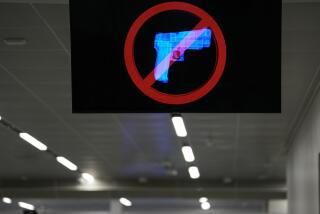Justices Reject Drunkenness as Excuse in Slaying
- Share via
WASHINGTON — Being drunk does not give a murder defendant the right to claim that he did not intend to commit the crime, the Supreme Court ruled Thursday.
The 5-4 decision upholds laws in Montana and nine other states that prohibit jurors from considering a defendant’s intoxication when deciding his guilt.
Throughout most of American history, “a defendant’s voluntary intoxication provided neither an excuse nor a justification for his crimes,” wrote Justice Antonin Scalia for the court.
The decision upholds the life prison term of a Montana man who was convicted of shooting and killing two friends after a night of heavy drinking. The man, James Egelhoff, claimed that he had no memory of the event or awareness of what happened.
In a separate ruling, the justices said the confidential notes of a psychotherapist or a social worker are private and need not be revealed in a federal court case.
The 7-2 ruling brings federal courts into line with the standard practice in the courts of all 50 states.
The ruling on intoxication reinforces a trend among both courts and legislators to hold drunks and drug users fully responsible for their acts.
California recently has made it more difficult for drunken defendants to use intoxication as an excuse. However, defense lawyers still are permitted to argue to jurors that, because their client was intoxicated, he should not be convicted of knowingly and deliberately committing murder.
“It’s a defense that is often used but it is not often successful,” said Matt Ross, a spokesman for state Atty. Gen. Dan Lungren.
Scalia noted that under English law and during the Colonial days, intoxication was not an excuse for criminal acts. In the 19th century, however, most states moved to allow jurors to consider whether a defendant’s drunkenness robbed him of the state of mind needed to commit a crime.
Since 1980 the pendulum has reversed itself and 10 states have passed laws forbidding jurors to consider intoxication as an excuse.
Montana jurors knew Egelhoff was thoroughly drunk, but they were told not to consider that fact in deciding whether he acted “purposely or knowingly” in shooting his companions.
The Montana Supreme Court reversed Egelhoff’s murder conviction and ruled that jurors cannot be barred from considering “all relevant evidence.”
However, in his case (Montana vs. Egelhoff, 95-566), Chief Justice William H. Rehnquist and Justices Scalia, Anthony M. Kennedy, Clarence Thomas and Ruth Bader Ginsburg disagreed.
The Constitution does not always demand the use of “all relevant evidence,” Scalia said, because hearsay and confidential communications are routinely excluded from criminal trials.
“I think this [decision] virtually invites the states to reconsider the ‘diminished capacity’ defense,” said Michael Rushford, president of the Criminal Justice Legal Foundation in Sacramento. Although California and most other states continue to permit defendants to argue that they deserve leniency because they were intoxicated, the court ruling makes clear that they do not have to do so, he said.
The psychotherapy case also involves keeping information from the jury.
“Effective psychotherapy depends upon an atmosphere of confidence and trust,” wrote Justice John Paul Stevens. That bond of trust will be broken, he said, if there is even a possibility that a confidential discussion will be disclosed in court.
The ruling in Jaffee vs. Redmond, 95-266, interprets the federal rules of evidence.
The case arose when a suburban Chicago police officer was sued for wrongfully shooting a man during a domestic dispute. Afterward, the officer, Mary Lu Redmond, underwent counseling with a clinical social worker employed by the Police Department.
During the civil trial, the department and the social worker refused to turn over notes of the sessions. The trial judge said the jury should assume that the conversations were damaging and the panel handed down a $545,000 verdict against the Police Department.
However, a federal appeals court in Chicago overturned the verdict and said the conversations should have been deemed privileged. The high court affirmed that judgment, with Rehnquist and Scalia dissenting.
More to Read
Sign up for Essential California
The most important California stories and recommendations in your inbox every morning.
You may occasionally receive promotional content from the Los Angeles Times.














